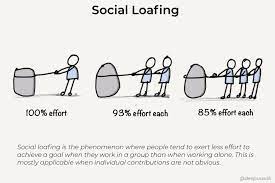In 1913, a French agriculture engineer run a tug-of-war experiment. He asked people to pull a rope individually and then in a group. He noticed that the larger the number of people pulling in the group, the less effort each one put in pulling. This became known as the Ringelmann effect or social loafing which states that in group settings, individual productivity decreases as the number of people in the group increases. There is no magic number of team members that will ensure productivity, but Ringelmann ‘s experiment and other studies on social loafing suggested that a team of 4 or 5 is best. A team composed of less than four members will be too small to be effective and so is a team with members in the double digits.
So why does individual productivity drop in large teams? Well, Ringelmann offere two suggestions for that: lack of coordination, this happens when the members of large teams do not know each other and do not know how their tasks relate to others’ tasks or fit in the big picture of things; and lack of motivation, this happens when a member of a large team thinks, “Is there anything left for me to say?”, “others already said it all”, or “will my opinion matter?”. These thoughts result because a person loses motivation to add value to a team when the person can’t see where their efforts will be most needed. The same thoughts happen when a person is unlikely to be noticed for his/hers lack of contribution to the team.
Large teams have always been preferred and touted as the solution to productivity challenges. We all aspired to be part of big teams at one stage of our careers. When companies grow, they expand their teams, not shrink them Clichés like:
“Alone we can do little, together we can do much”, or “Teamwork makes the dream work”, dominated our thinking about teamwork for so long. Big teams make sense on the premise that they help generate different ideas from various people. The Ringelmann effect taught us a fresh perspective on what happens among big teams. When big teams come together, the number of ideas generated will likely be disproportionate to the number of people in the team. Why? Because some people will put minimum effort and will think that their ideas won’t matter. Big teams are not always the solution to our productivity challenges.
“There is nothing wrong with staying small. You can do big things with a small team.” Jason Fried

